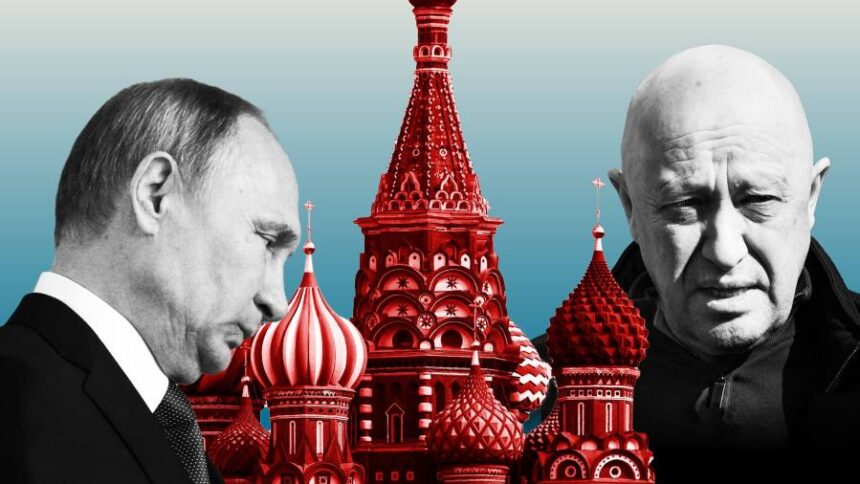Guns, drugs, gold bars, unconvincing wigs and a framed photo of severed heads — Russian state media this week deluged audiences with images they said were taken during a raid on the St Petersburg home of Wagner warlord Yevgeny Prigozhin.
But the attempt to discredit Prigozhin appeared mild in comparison with the retribution meted out to other opponents of Russia’s president Vladimir Putin, such as the poisoned former spy Alexander Litvinenko and murdered journalist Anna Politkovskaya.
While the warlord was ridiculed on television, he appeared free to travel around Russia just weeks after attempting to march on Moscow with his fighters, suggesting he was hardly being treated as enemy number one.
The relatively lenient approach to Prigozhin, whose relationship with Putin dates back to the lawless St Petersburg of the 1990s, reflects the Kremlin’s weakness after his attempted insurrection and its deep entanglement with Wagner’s business empire, said observers and members of Russia’s elite.
“He is being humiliated,” said Tatiana Stanovaya, senior fellow at the Carnegie Russia Eurasia Center. “They decided to kill Prigozhin the politician . . . But as a businessman, they’re still deciding what to do with him.”
A person who has known the warlord since the 1990s suggested the leeway to tie up loose ends at his businesses was probably part of a peace deal hashed out as Wagner’s tanks rumbled towards Moscow in June.
“It’s not like he’s just running around. It’s more like his empire is being taken apart and they’re making preparations for his departure . . . When things calm down, I think he’ll have problems, but who thinks about the future more than a week ahead?” the person said.


The militia boss, who was first labelled a “traitor” then apparently excused for leading the armed revolt, had not relocated to Belarus with his fighters, as the Kremlin said he would, said Belarus’s leader Alexander Lukashenko, who brokered the deal to end Prigozhin’s insurrection.
Following the uprising on June 24, Prigozhin’s private jet has been tracked flying between Moscow and St Petersburg, while some local outlets have reported sightings of the warlord in different locations in Russia. The Kremlin appeared indifferent on Thursday, saying it had “neither the capability nor the desire” to track him.
Parts of Prigozhin’s business empire also appear to be continuing operations, with the Wagner Group, for example, still recruiting new fighters.
Prigozhin’s jet has been flying around Russia and to Belarus

Cartography by Steven Bernard © FT; Data from Flightradar
The flight paths of Prigozhin’s private jet between June 25 and July 6
Prigozhin was even able to reclaim some Rbs10bn ($110mn) that authorities had seized from him in cash on the day of the insurrection, according to the St Petersburg outlet Fontanka. Rather than be exiled immediately, the warlord has been given space to deal with his business empire in Russia and tie up loose ends, said analysts and members of the country’s elite.
Lukashenko, speaking to journalists on Thursday, suggested Putin — who called the coup-plotters “traitors” in a furious speech on the day of the insurrection — had softened his stance in recent days.
“I don’t know everything about the relationship,” Lukashenko said. “But you have to understand that Putin knows Prigozhin much better than I do . . . back from St Petersburg, when they lived and worked there.”
Prigozhin, who was finishing a lengthy prison sentence for robbery when the Soviet Union fell, started out in catering and owes the rapid expansion of his business to the fact that Putin, then deputy mayor of St Petersburg, started visiting a restaurant he had opened there. For this, Prigozhin was nicknamed “Putin’s chef”, and soon became his fixer for other tasks.
“They had a very good relationship with each other. Maybe even more than kind,” Lukashenko said. Though Putin accused the Wagner Group of “treachery” on the day of the insurrection, that initial reaction became “much softer”, Lukashenko said. “It’s one thing to speak out to the world, but what you feel inside is another thing entirely.”

Russia’s government is also a major customer of Prigozhin’s murky empire, which sprawls from school catering to internet troll farms and mercenaries fighting for Russia in Ukraine, Syria and across Africa. Moscow therefore has an interest in ensuring that its business is wrapped up neatly, and perhaps even continues in parts.
Prigozhin is likely to have won concessions beyond the freedom to move to Belarus, said Abbas Gallyamov, an analyst and former speechwriter for Vladimir Putin, as the militia leader was negotiating from a position of some strength on the day of the mutiny.
“Prigozhin wasn’t physically defeated,” Gallyamov said. “He took Rostov, he made his way to Moscow, he could have tried to take the Kremlin. He put the system on the brink of collapse — so of course he wouldn’t be agreeing to a deal in which he loses everything.”
At the same time, the Kremlin may be treading carefully with Prigozhin because of an acute awareness of weaknesses in the system that were exposed by his mutiny. Any sharp moves against Wagner now could provoke the group, or fire up other actors to rebel, Gallyamov suggested. “The system is so weak right now, anything could be fatal,” he said.
Still, while Prigozhin’s mutiny has undermined confidence in Putin among many of the Russian elite, few are willing to make a move against him, said a former senior Kremlin official.
“People don’t want to take any responsibility, because Putin’s at the top. Why bother? All that’ll happen is you’ll get your ears clipped,” they said.
Even after the mutiny risked plunging Russia into chaos, Putin is still likely to rely on his close personal relationships with long-trusted people such as Prigozhin instead of reshuffling his elite, said a sanctioned Russian billionaire.
“Putin is all about unwritten personal codes,” the billionaire said. “And for a Russian tsar, he’s humane, to an extent. He isn’t Gandhi, but compared to Stalin, he treats people quite nicely.”
But though the Kremlin has cause to tread carefully with Prigozhin, images shown on state TV — apparently showing the inside of his home, or the warlord dressed in various unconvincing disguises, which quickly turned into a meme — were fair game in the government’s eyes as it seeks to destroy the Wagner leader’s popularity, observers suggested.
State media showed photos of grand home interiors with a private pool, sauna and home gym, clearly aimed at discrediting Prigozhin’s reputation as a critic of corruption in the armed forces, which has won him public popularity.
They also showed an office filled with memorabilia and items that seemed to revel in Wagner’s cruelty, such as a photo of severed heads in the desert and an enormous replica sledgehammer of a type made famous by a video posted online in which Wagner fighters used one to execute a deserter among their ranks.
But humiliating the warlord in public may not mollify those who see Putin as failing to stick to his word: pledging, on the morning of the insurrection, to punish Prigozhin as a traitor, and by the evening, letting him off the hook.
The apparent contradictions in Prigozhin’s relationship with the Kremlin are a glaring sign of weakness, a former senior Russian official said.
“This is just complete impotence. There’s nothing deep there. Everyone has heard Putin settling scores with Prigozhin a week [after the mutiny]. It’s total madness,” the former official said. “Putin just doesn’t notice we’re turning into a banana republic without any bananas.”
Ekaterina Vinokurova, a Russian journalist and until November 2022 a member of the Russian president’s human rights council, wrote that the Kremlin’s apparent lenience was “very unpleasant to me, as a Muscovite”.
“A week and a half ago, Prigozhin was on his way to my hometown in tanks. He was stopped, sent to Belarus,” she said. “And now what, he gets to stroll around my city? As what, a winner? As someone who has been pardoned?”








